What does the pilot Captain Sully Sullenberger, the explorer Sir Edmund Hillary, and a High Trails student have in common?
At a first glance, these three people couldn’t be more different. Captain Sullenberger saved the lives of 155 people when he emergency-landed US Airways Flight 1549 in the Hudson River. Sir Hillary was the first to summit Mt. Everest in 1953. And High Trails students often battle homesickness as they complete a whole week away from home for the first time.
While attending the Western Recreational Outdoor Leadership Conference, I listened to a seminar discussing the four behaviors or attitudes that survivors have in common.
Survivors 1) don’t deny the severity of the situation they are in, 2) have hope, 3) take small steps to accomplish their goal, and 4) are willing to give and receive help.
During the seminar, we discussed these attitudes as they were seen in three real life examples. We saw how Captain Sully Sullenberger utilized them as he landed Flight 1549 in the Hudson River, how the Bielski Partisans struggled against adversity with these attitudes as they defied the Nazis, and how Marion Pritchard used these four attitudes as she helped hide 150 Dutch Jews, including the Frank family, during the German occupation in Amsterdam.
But while these three real life examples are all extreme cases of survival, these four attitudes are still extremely relevant in regards to High Trails students. As instructors, we see many students who exhibit these behaviors as they battle homesickness, and often go on to have the time of their life, but we also see students who struggle to overcome homesickness.
By understanding these four attitudes, we can help recognize which of these four attitudes our students are struggling with, and better help them overcome their homesickness and go on to have an incredible week.
1. Don’t Live in Denial
If you asked a hero or survivor about their situation, you will never hear them deny the severity of the situation they were in. Captain Sullenberger even described feeling, “the worst sickening, pit-of-your-stomach, falling-through-the-floor feeling” as he realized he was flying with no engines and a plane full of people over the largest city on the east coast.
For a High Trails student, the pit-of-the-stomach feeling isn’t coming from engines failing, but realizing that they are a long way from home and it is going to be a very, VERY, long week until they get back on the busses and return to school. Often, this is the behavior where students get stuck. It is easy to accept that the week is going to be long and challenging, what isn’t easy is the next attitude.
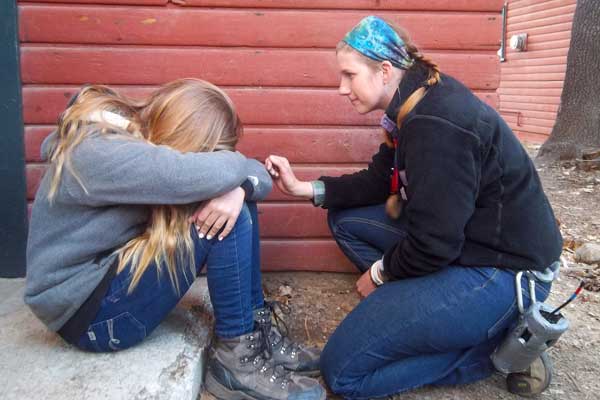 2. Have Hope
2. Have Hope
No matter what the survival situation is, it is imperative to have hope that you can actually survive it. This can be difficult, especially after accepting the severity of the situation. Dealing with homesickness, for many students, can be just as daunting. But the students who have hope are always the most successful and get the most out of the week. By encouraging students to have hope that they can have fun at High Trails, and can get a lot out of it, we can help students have hope.
This often begins with getting students thinking can and will, instead of can’t and won’t.
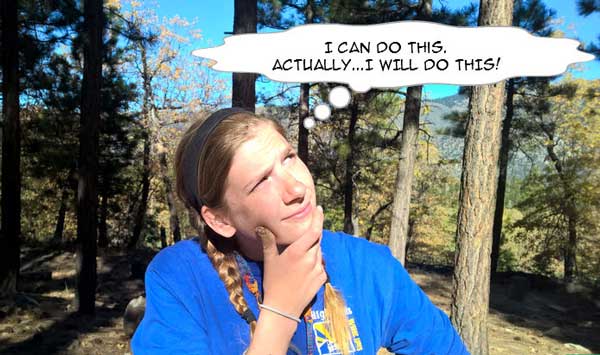 3. Take Small Steps
3. Take Small Steps
How do you eat an elephant? One bite at a time, of course. Here at High Trails, we call it challenge by choice. Oftentimes, the challenge for our students is choosing to remain positive throughout the week as they battle homesickness. On Monday evening, the week looming ahead can seem like an insurmountable challenge. But the most important piece, in any story of survival, is that the survivors keep moving, putting one foot in front of the other until they reach their goal.
As instructors, we can encourage this constant movement by helping our students break the week into these bite sized pieces. By breaking down the week for them, and giving positive reinforcement as our students take each step, we can help them be successful throughout the week.
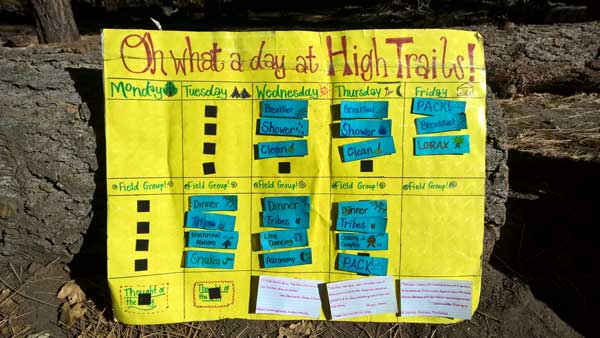 4. Be Willing to Give and Get Help
4. Be Willing to Give and Get Help
Perhaps the most important attitude of survivors is that they are willing to get help from the people surrounding them. While we, as instructors, cannot make our students be open to receiving help, we can be there for them when they ask for help. Sir Edmund Hilary could not have summited Everest alone, and it is impossible for us to expect our students to be successful at overcoming homesickness without help from the people around them.
But not all the help needs to come from instructors. It is important for us to not only encourage students to seek help from their instructors, but also to encourage them to find support from their peers. By inspiring students to seek help from their peers, we further our goals to encourage teamwork, and a “framily” within both the students’ cabin and trail groups. When we encourage students to receive help from another to overcome homesickness, we end up empowering that student to help others in turn.
By understanding these four attitudes of survivors and applying them to the cases of homesickness we see every week here at High Trails, we can become better instructors and mentors to these students by empowering them to succeed. We also can help the students understand what it takes to be successful when faced with a daunting challenge, and therefore equip them with the tools that they will undoubtedly need later in life.
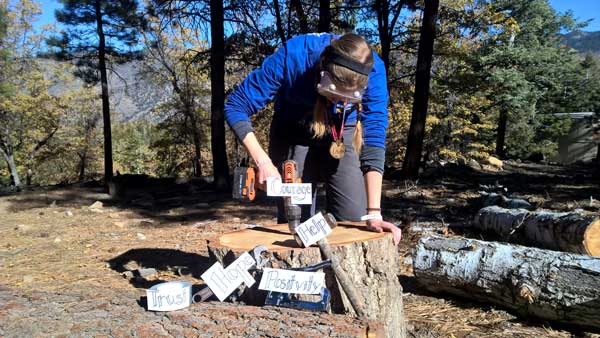 At High Trails Outdoor Science School, we literally force our instructors to write about elementary outdoor education, teaching outside, learning outside, our dirty classroom (the forest…gosh), environmental science, outdoor science, and all other tree hugging student and kid loving things that keep us engaged, passionate, driven, loving our job, digging our life, and spreading the word to anyone whose attention we can hold for long enough to actually make it through reading this entire sentence. Whew…. www.dirtyclassroom.com
At High Trails Outdoor Science School, we literally force our instructors to write about elementary outdoor education, teaching outside, learning outside, our dirty classroom (the forest…gosh), environmental science, outdoor science, and all other tree hugging student and kid loving things that keep us engaged, passionate, driven, loving our job, digging our life, and spreading the word to anyone whose attention we can hold for long enough to actually make it through reading this entire sentence. Whew…. www.dirtyclassroom.com


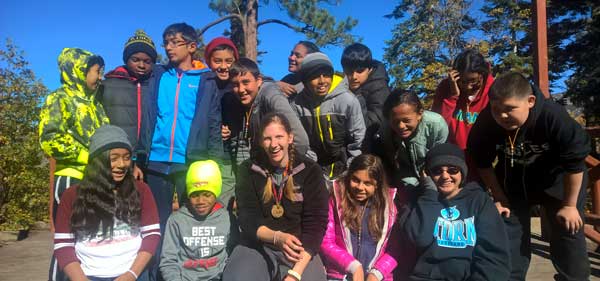
Comments are closed.